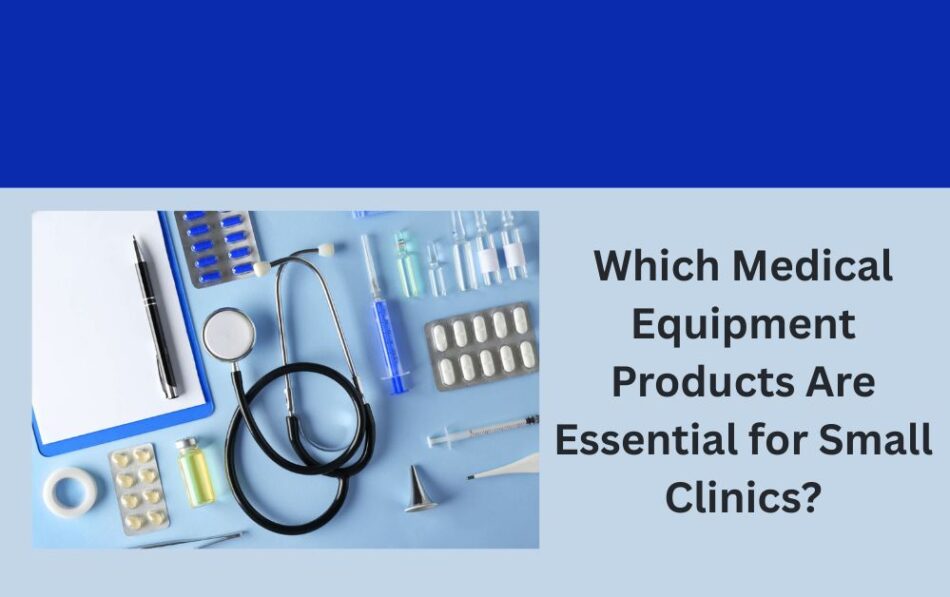Owning a small clinic has its perils. Perhaps one of the essential factors is your medical equipment products. Appropriate equipment is vital for making precise diagnoses, successful treatment and patient safety. Small clinics are typically space- and budget-limited, so selecting the necessary equipment is important.
What are The Essential Medical Equipment for a Small Clinic Saving lives and maintaining general health has got more to do with the availability of proper medical equipment.
1. Basic Diagnostic Equipment
Note : Medical Equipment Products provide hospitals and clinics with reliable tools and devices to ensure accurate diagnosis, effective treatment, and improved patient care.
Diagnostic tools are the foundation of any clinic. They help doctors assess patient health quickly and accurately.
Blood Pressure Monitors
Monitoring blood pressure is a routine part of patient care. Digital or manual blood pressure monitors allow quick readings and help detect conditions like hypertension early.
Thermometers
Temperature measurement is crucial for identifying infections or fevers. Digital thermometers are fast, accurate, and easy to use in small clinics.
Stethoscopes
A good quality stethoscope is essential for checking heartbeats, lung sounds, and other vital signs. It is a simple yet vital tool in any clinic.
2. Basic Imaging Equipment

Even small clinics need some imaging equipment for accurate diagnosis.
X-Ray Machines
Portable or compact X-ray machines help detect fractures, chest infections, and other conditions without needing a full hospital setup. They are cost-effective and space-saving.
Ultrasound Machines
A small ultrasound machine allows quick imaging for pregnancy checks, abdominal scans, or soft tissue evaluations. Portable versions are ideal for limited space.
Benefits of Imaging Equipment
Having basic imaging equipment reduces the need for referrals, saves time, and improves patient satisfaction by providing immediate results.
3. Laboratory Equipment
Small clinics often perform basic tests on-site to speed up diagnosis.
Hemoglobin and Glucose Meters
Devices for checking blood sugar and hemoglobin levels are essential for routine health checks and managing chronic conditions like diabetes and anemia.
Urine Test Kits
Simple urine test kits help detect infections, kidney problems, and other health issues quickly.
Microscopes
A basic microscope can assist in examining blood samples, urine, or other biological specimens for quick lab analysis.
4. Patient Care Equipment
Equipment that supports patient comfort and care is important in small clinics.
Examination Tables
A sturdy examination table is essential for routine check-ups, minor procedures, and patient comfort. Adjustable tables are preferred for flexibility.
Infusion Pumps
Small clinics offering outpatient treatments may need infusion pumps to administer fluids or medications accurately.
Pulse Oximeters
Pulse oximeters monitor oxygen levels in patients, which is especially important for respiratory conditions or during emergencies.
5. Sterilization and Hygiene Equipment
Maintaining hygiene is critical in healthcare. Small clinics must ensure infection control.
Autoclaves
An autoclave sterilizes surgical instruments, ensuring safety during minor procedures or injections.
Hand Sanitizers and Disinfectants
Using hand sanitizers, disinfectants, and cleaning equipment reduces the risk of infection spread among patients and staff.
Protective Gear
Gloves, masks, and gowns are necessary to protect both healthcare providers and patients.
6. Emergency and First Aid Equipment
Even small clinics should be prepared for emergencies.
Defibrillators
A portable defibrillator can save lives during cardiac emergencies.
First Aid Kits
A fully stocked first aid kit is essential for treating minor injuries, cuts, burns, or allergic reactions.
Oxygen Cylinders
Oxygen cylinders are important for patients experiencing breathing difficulties. Portable oxygen units are ideal for small clinics.
7. Software and Record-Keeping Tools
Digital tools improve efficiency and patient management.
Electronic Medical Records (EMR)
Using an EMR system helps track patient history, prescriptions, and lab results efficiently. It reduces paperwork and errors.
Appointment Management Software
Software that manages appointments reduces waiting times and improves clinic workflow.
Billing and Inventory Management
Digital billing and inventory tracking help small clinics manage supplies, costs, and patient payments efficiently.
8. Choosing the Right Supplier
Selecting reliable suppliers ensures long-term performance and support for your equipment.
Check After-Sales Support
Suppliers offering installation, training, and maintenance services help clinics use equipment effectively without interruptions.
Consider Cost and Quality
Balance affordability with quality. Low-cost equipment may save money initially but could lead to higher maintenance costs in the long run.
Warranty and Certification
Always choose certified medical equipment with a warranty to ensure safety, reliability, and compliance with healthcare standards.
Conclusion
Small clinics can deliver great healthcare if they select the appropriate medical equipment products. Diagnosis tools, fundamental imaging instruments, labículos You have the option to care for the patient and sterilize the cockroaches.Among other things, also a kit of progressivism and software.
Small UAE clinics can provide conscientious, cost-effective care to their patients by emphasizing quality and support from suppliers. Selecting the right equipment not only enhances patient care, but also helps to support a clinic’s reputation and operations.
For more insightful articles related to this topic, feel free to visit thestarbiznews
 WhatsApp Us Now
WhatsApp Us Now






